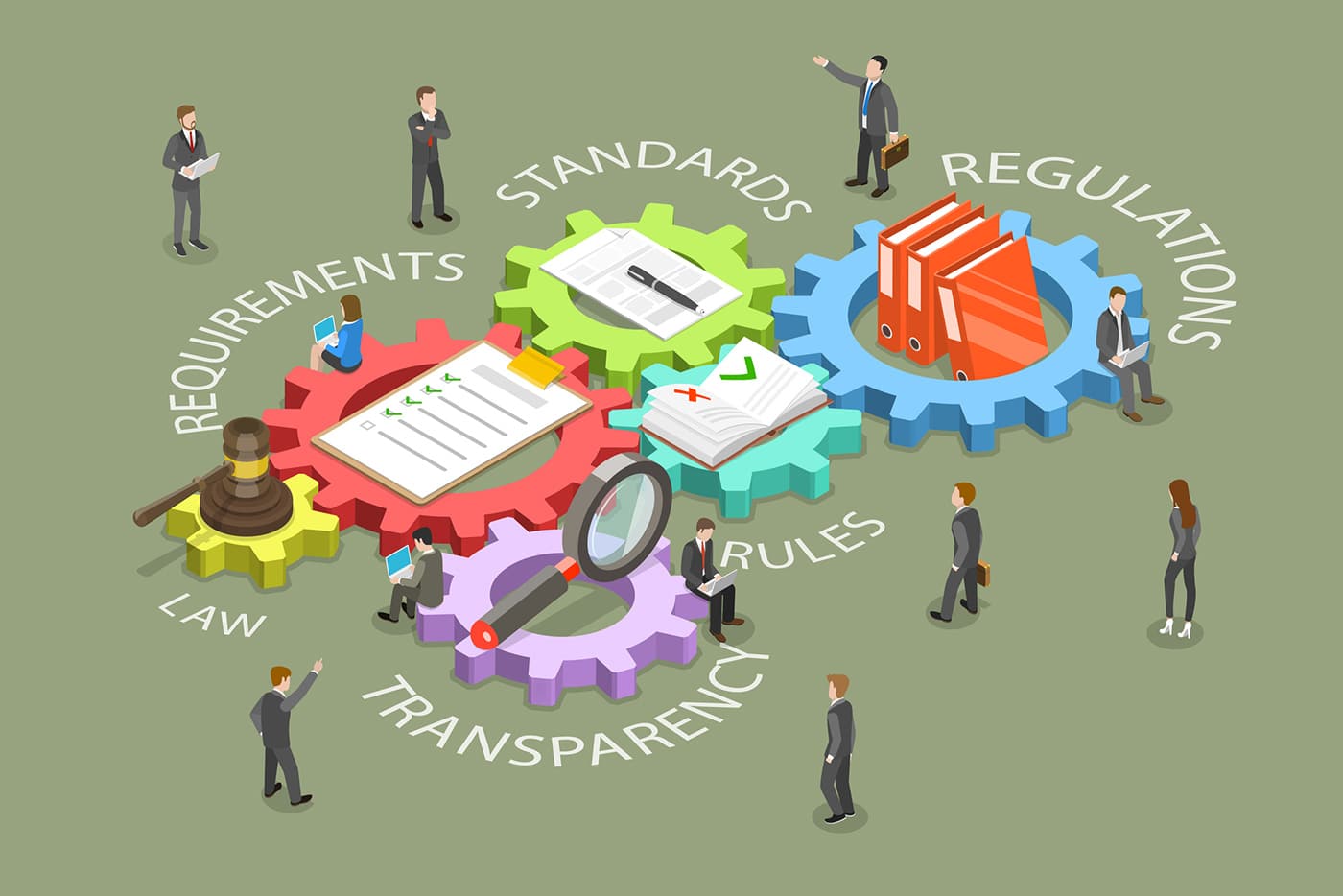Opening and maintaining a business requires more than setting up shop and promoting your product. To operate legally, you need to follow business regulations.
While some regulations apply to nearly every business, others are more pertinent to specific industries.
In general, government regulation of business covers the following areas:
- Employment
- Taxes
- Advertising
- Labor
- Environment
- Privacy
- Health and Safety
Let’s go through these common business regulations and how they impact your company.
What Are Small Business Regulations?
Small business regulations are laws that owners must follow to operate legally. The impact of government policies on your business depends on multiple factors, including:
- Your business’s industry
- How many people you employ
- What type of product or service you provide
- The employees’ work environment
Some government regulation examples include construction site employees being provided personal protective equipment (PPE) or the Family and Medical Leave Act (FMLA), which mandates employers offer at least 12 workweeks of leave in 12 months for a child’s birth, care of an immediate family member with a serious health condition and other factors.
Neither of those examples is applicable across every job. For instance, the construction worker is more likely to need PPE on a day-to-day basis compared to someone in an office environment.
Also, FMLA applies only to businesses in the private and public sectors with 50 or more employees. A smaller operation of only a few employees isn’t required to adhere to that business regulation.

The Most Common Business Regulations
Generally, no matter what type of business you have, you’ll need to follow business regulations in these categories. Work with a business attorney when setting up your business to ensure you’re abiding by the laws and regulations you should be. Retain a business law expert so you can get updates to business laws and regulations, protecting you and your business from a lawsuit, fines or business closure.
1. Employment
The U.S. Equal Employment Opportunity Commission (EEOC) requires that businesses follow federal anti-discrimination laws, which include the following:
- You must provide equal pay for male and female employees with the same skill levels performing the same work.
- You’re not allowed to discriminate based on race, ethnicity, religion, sex, sexual orientation, gender identity, disability and other factors. Employers must also reasonably accommodate employees based on religious beliefs or disabilities.
- You can’t discriminate based on age.
Sometimes a federal government regulation of business applies to a company only if it employs a minimum staff size. For example, equal pay and anti-discrimination business regulations (including race, religion and disability) apply to companies with at least 15-19 employees, according to the EEOC. Businesses with 20 or more employees must abide by equal pay and anti-discrimination business regulations and face the consequences of age-based discrimination (words or actions that adversely impact people aged 40 and older). Business owners also can’t retaliate against employees or applicants who report discrimination or participate in a discrimination lawsuit.
2. Taxes
Businesses must meet federal, state and local tax obligations to operate legally. How your business is structured (corporation versus partnership versus limited liability company, for example) will determine what taxes you owe and when.
Get information on your business tax obligations here.
3. Advertising
The Federal Trade Commission (FTC) enforces government regulation of business advertising. Truth-in-advertising business regulations mandate that advertisements can’t be deceptive, and businesses must have evidence to support any claims, such as environmental and health benefits, they make in ads. This government regulation applies across all advertising media, including radio, TV, the Internet and periodicals.
When it comes to advertising, why do regulations for business exist? False or misleading advertising can negatively affect consumers beyond their being disappointed by an inferior product or service. The FTC notes that it especially scrutinizes ads that impact “consumers’ health or their pocketbooks.” During the COVID-19 pandemic in the U.S., the FTC sent warning letters to companies that might be deceiving customers with claims about how their respective business’s products or services can improve personal health or ease financial hardships. Failing to heed the warning letters and observe business regulations could lead to a lawsuit from the FTC.
4. Labor
The U.S. Department of Labor administers labor laws, many of which are industry-specific. Some common business regulations include:
- Employees must make minimum wage and be paid overtime of 1.5 times the regular pay rate unless they are exempt and earn more than $35,568 in salary per year.
- The work environment must prioritize employee safety.
- Child labor laws protect the educational opportunities of minors and prohibit hiring children for dangerous positions.
- Employers can only hire legal citizens or workers with appropriate work permits or employment-related visas.
- Certain business regulation posters must be displayed in the workplace for employee visibility.
Failure to adhere to these business regulations could result in fines, a lawsuit or a criminal case, depending on the severity of the violations.
5. Environment
The United States Environmental Protection Agency has business regulations in place depending on the business sector, including regulations for industries like agriculture, automotive, construction and oil and gas.
Businesses have a legal obligation to follow regulations to avoid harming the environment, such as properly managing waste and making sure any air and water emissions align with the Clean Air Act and Clean Water Act standards.
6. Privacy
Businesses often have access to the personal information of employees, job applicants and consumers, including home addresses and social security numbers.
Especially in the digital age, access to information — and privacy concerns — are greater than ever. Businesses are not allowed to:
- Collect certain information from minors
- Share certain information with specific parties
- Use private information in any way other than what a consumer or employee agrees to
You should also be aware of privacy business regulations you must follow if your business serves customers in certain countries. For example, companies with customers in Europe must follow the EU General Data Protection Regulation when dealing with those customers.
7. Health and Safety
The U.S. Department of Labor’s Occupational Safety and Health Administration (OSHA) helps enforce workplace health and safety standards.
The government regulation of business here is vast, varied and specific to each industry. For example, day-to-day work differs among construction, agriculture, manufacturing and office environments, and so do the health and safety needs for their respective workers.
Employers not only have to comply with OSHA’s business regulations for a safe workspace, but they must provide proper training for employees engaging in potentially dangerous work.
Note that it’s not only the federal government that mandates health and safety rules. You’ll have to comply with enforced state and/or local government regulations, examples including restaurant or nursing home inspections.
Other Business Regulations to Keep in Mind
Other government regulations impact a business. One is antitrust laws. Your business is not allowed to conspire with other companies to:
- Fix market prices
- Boycott a supplier
- Create market monopolies
These laws help protect consumers and foster a competitive free-market system that benefits customers.
Also, your business might need a specific license to operate. If you sell certain products (like alcohol) or perform a particular service (like those in a beauty salon), you and those you employ may need specific licenses. You’ll need to make sure those are always current to operate legally.
New Government Mandates and Regulations
Federal, state and county governments enacted new government mandates and regulations throughout 2020 and 2021 in response to the COVID-19 pandemic. The business regulations vary from state to state and sometimes from county to county within the same state. Some business regulations included:
- Employers had to provide paid sick leave and expanded family medical leave for employees*
- Ensuring workers have a safe environment, including providing PPE and encouraging social distancing
- Wearing face masks
- Training employees how to minimize the risks of spreading COVID-19
*Mandatory expanded, flexible leave expired Dec. 31, 2020. Employers can receive tax credit for voluntarily expanding medical and family leave through March 2021.
Why Does the Government Regulate Business?
Business owners don’t always embrace business regulation laws, but they exist to protect employees and consumers. Some reasons for business regulations in the U.S. include:
- Creating a safe working environment for employees and customers
- Guaranteeing employees the benefits they’re entitled to
- Ensuring business monopolies don’t form
- Protecting the environment
- Ensuring businesses in similar industries are held to the same standards and are not allowed to use unfair business practices to their advantage
Regulation of business is something all companies must deal with. Even solopreneurs who work for themselves must abide by tax laws regulating business.
To stay safe and legal, know what common business regulations may apply to you so you can follow them.
What Are the Small Business Regulations That Apply to You?
The Small Business Administration is a great resource to get information on business regulations. You can find a local office to connect with and look up information online for topics like these:
- Licenses and permits and how to apply for them
- How to stay legally compliant with federal and state laws
- Business tax information
You can also connect with your local chamber of commerce to see what state and local business laws and regulations you should be following.
The U.S. Department of Labor also provides an online FirstStep Employment Law Advisor service, so you know which major federal employment laws apply to your business. There’s also a FirstStep Poster Advisor that helps companies learn which posters they’re legally required to display at the workplace.
Working with a business attorney, especially in the early stages of forming your business, is a good idea. You don’t want to risk a lawsuit, get your business shut down or face jail time for not following a legal regulation.
Business regulations are continually evolving, and new rules pop up often. Work with someone versed in business law to ensure your company is always compliant and legally operating.











